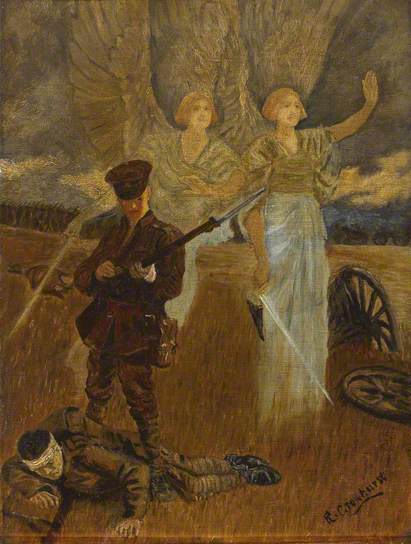‘The Angel of Mons’ by R. Crowhurst (UK National Army Museum)
I’ve been catching up on the BBC’s latest First World War documentary series, as the centenary approaches (that fact is not coincidental to my sporadic posting – day job and all). It’s actually pretty good, though I did catch a dodgy claim in the first episode. The redoubtable Mr Paxman, explaining the ‘defeat’ of the Battle of Mons and the famous story of angelic salvation, told us that;
“There was one simple explanation for the Angels of Mons: exhaustion”.
This is indeed a simple and plausible explanation for a bizarre story of angelic apparitions rushing to the aid of British Tommies. But it’s wholly unnecessary. The origins of the story as a piece of fiction turned folklore are well documented. Arthur Machen’s ‘The Bowmen’, written in faux documentary style, was modified to be more Protestant Christian (angels not unquiet dead), and embraced as genuine by Spiritualists, who then went hunting for/fabricated ‘evidence’. The rest is history.
If you’d like the real story, I recommend this article by the excellent David Clarke in the equally great Fortean Times, and, if you can access it, another of his from the journal Folklore. He went on to write a book on the subject. You can also check out this Skeptoid podcast. Another article by Steve MacGregor supports Clarke’s thesis, and focuses on the propaganda and recruitment value to the British government of this kind of story.
It does surprise me in the Age of Google, that no-one researching this series bothered to even read the Wikipedia page on the subject. I suspect, given the description of Mons as a ‘defeat’, that they chose to twist the tale to suit the narrative of exhausted, beaten troops. I don’t think they’ve entirely shed the ‘lions led by donkeys’ theme. In fact, as dire as casualties appeared at the time to a naive public, Mons was actually a very successful fighting retreat.
It’s a shame in another way too, because Clarke’s interpretations of the story are far more interesting. He casts the construction of the story as myth-making for the industrial era, and as a psychological coping mechanism for people on the home front to deal with the horror of modern war and mass casualties amongst their loved ones. To this I can perhaps add something to bring things full circle to the many soldiers who survived Mons. There actually is a direct relevance here that doesn’t rely on hallucination. Whether or not there were/are ‘no atheists in foxholes’, as the war progressed and the remaining soldiers of the professional army were joined by civilians, it appears that the number of believers in the supernatural also increased. Every soldier was issued a set of identity disks (later nicknamed ‘dog tags’), to be recovered in the event of their death. On these tags, alongside abbreviations like ‘CE’ for Church of England’ and ‘JEW’ for Jewish, was also stamped ‘SPIRI’, for ‘Spiritualist’. This reflects a booming recruitment period for that faith as people struggled to deal with the loss of sons, fathers, and partners. These soldiers and perhaps non-Spiritualists also, must have brought this civilian tale of an incident that never happened with them to the front, and carried that belief with them into battle. I may not believe it myself, sitting in the comfort of home, surrounded by my loved ones; but I cannot help hoping that it provided them some comfort.
